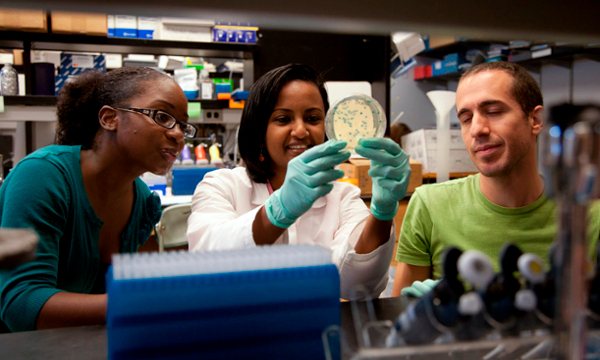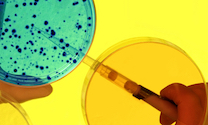Overview
The MMG program offers outstanding training and educational opportunities in the areas of bacteriology, virology, and parasitology. Through participation in required courses, conducting laboratory rotations and attending seminars, first year students are exposed to basic concepts in these major disciplines of microbiology. These experiences allow the student sufficient opportunity to learn the varied research avenues available and to decide on a faculty mentor.
Description of the MMG faculty and their research interests..
MMG faculty with interests in bacteriology conduct basic research that addresses important, contemporary problems in the areas of microbial physiology (including sporulation, biofilm formation, mechanisms of antibiotic resistance and production, and cellular communication systems), microbial genetics (mechanisms of control of gene expression, transposition, and recombination), bacterial virulence factors. MMG faculty research many species of bacteria, including: Streptococcus pyogenes, Streptococcus pneumoniae, Streptococcus mutans, Escherichia coli,Bacillus subtilis, Neisseria gonorrhoeae, Neisseria meningitidis, Pseudomonas aeruginosa, Acinetobacter baumannii, Francisella tularensis, Clostridioides difficile, Klebsiella pneumoniae, Chlamydia trachomatis, Proteusmirabilis, Staphylococcus aureus, Enterobacter cloacae, segmented-filamentous bacteria (SFB), Lactobacillus reuteri, Bifidobacterium pseudolongum, Citrobacter rodentium, Mycobacterium tuberculosis, Stenotrophomonas maltophilia, Candida auris, and the gastrointestinal microbiota.

Figure 1. This figure highlights the molecular pathogenesis of Agrobacterium tumefaciens molecular biology as it causes disease in susceptible plants.(Courtesy of MMG faulty member Dr. David Lynn)
MMG faculty with interests in virology conduct basic research that address important, contemporary problems in the areas of viral replication, pathogenesis and transmission, roles of viruses in oncology, HIV/AIDS, influenza, COVID-19, restriction by and escape from immune responses and development of antiviral drugs and vaccines. Noteworthy training opportunities in virology exist through research projects directed and facilitated by MMG faculty members in the Emory CEIRR Center (MMG faculty member Anice Lowen, Director) and the Emory Vaccine Center (MMG faculty member Rafi Ahmed, Director).

Figure 1. This figure highlights the molecular pathogenesis of Agrobacterium tumefaciens molecular biology as it causes disease in susceptible plants.(Courtesy of MMG faulty member Dr. David Lynn)
MMG faculty with interests in parasitology focus on malaria host-pathogen interactions, with the aim of better understanding how malaria infection takes hold and causes disease. Research topics include mechanisms of parasite invasion and residence in host cells, antigenic variation, immune mechanisms of parasite control, immuno pathogenesis of malaria infection and the impact of co-infections on malaria. Multiple tools are being used to research malaria on campus and current funded work includes a large NIH-funded systems biology project Malaria Host-Pathogen Interaction Center (MaHPIC) that simultaneously models multiple aspects of malaria biology. Faculty members who specialize in malaria include Dr. Mary Galinski.





